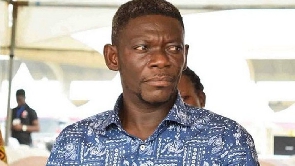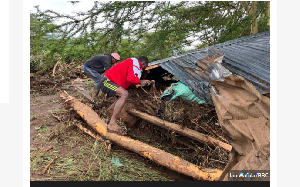- Home - News
- TWI News | TV
- Polls
- Year In Review
- News Archive
- Crime & Punishment
- Politics
- Regional
- Editorial
- Health
- Ghanaians Abroad
- Tabloid
- Africa
- Religion
- Election 2020
- Coronavirus
- News Videos | TV
- Photo Archives
- News Headlines
- Press Release
General News of Monday, 25 June 2007
Source: GNA
Combat environmental degradation - Asamoah-Boateng
Accra, June 25, GNA - Mr. Stephen Asamoah-Boateng, Minister of Local Government, Rural Development and Environment, on Monday appealed to sub-regional environmental organizations to be committed in their efforts at combating environmental degradation on the marine and coastal systems.
He said the continuous pressure being put on the coastal systems required serious commitment and preventive action at all levels including local, national, regional and global levels. "It has become imperative that countries identify with regional actions that seek to provide solutions to our coastal and marine environmental challenges so that coastal populations who depend extensively on coastal resources for their livelihood will not be unduly affected," he said.
Mr Asamaoah-Boateng was speaking to participants attending the "High Level Meeting for the Finalisation and Adoption of the Land-Based Activities (LBA) Protocol for The Abidjan Convention and the Strategic Action Programme (SAP)", which opened in Accra on Monday. The 22 participants from the 16 countries making up the Guinea Current Large Marine Ecosystem (GCLME) Project, which encompasses the area between Guinea Bissau and Angola, are in the next five days expected to review the draft LBA and adopt the protocol. Mr Asamoah-Boateng said for all the 16 countries participating in the GCLME project, a large segment of their population depended heavily on the resources of the coastal and marine environment for their socio-economic development and livelihood.
"Unfortunately, these marine and coastal resources continue to be negatively impacted upon by land-based human activities. "This negative impact on the coastal and marine resources is made worse by the lack of statutory provisions and appropriate legal framework for their protection and preservation."
Mr. Asamoah-Boateng said the finalisation of the Trans-boundary Diagnostic Analysis (TDA) in the first year of the implementation of the GCLME project set the basis for the formulation of a Strategic Action programme to practically address these problems.
He said the ecosystem approach on which the project was premised recognized that the living resources and pollutants in the region were trans-boundary and hence needed to be managed in a holistic and collaborative manner.
The Minister said it was for this reason that the participants' presence at the workshop was critical for the harmonization of policies, procedures and regulatory mechanisms across member states. Professor Babajide Alo, who chaired the function, said the GCLME region was ranked among the most productive coastal and offshore waters of the world.
He said it was noted for its rich fishery resources, oil and gas reserves, precious minerals, high potential for tourism and an important reservoir for marine biological diversity of global significance. Prof. Alo said the 16 countries were working hard at reversing the trend of degradation of the coastal systems so that it could continue to support those whose livelihoods depended on it. Dr. Chika Ukwe, Project Manager, UNIDO Office in Vienna, said his outfit was considering critically the types of investments that would help reverse the trend of degradation in the region.
Prof. Chidi Ibe, Executive Secretary, GCLME, announced that six other countries aside the GCLME were joining the project to produce the final adoption of the LBA protocol. The countries are Senegal, The Gambia, Namibia, South Africa, Mauritania, and Cape Verde. 25 June 07










